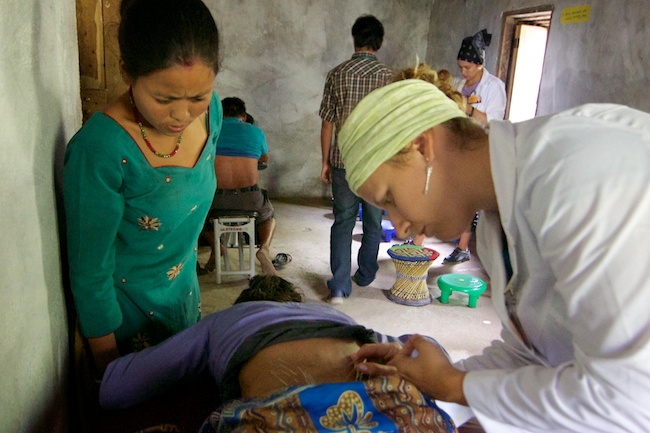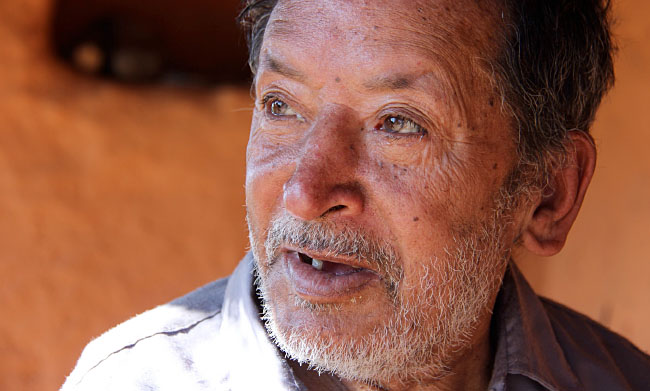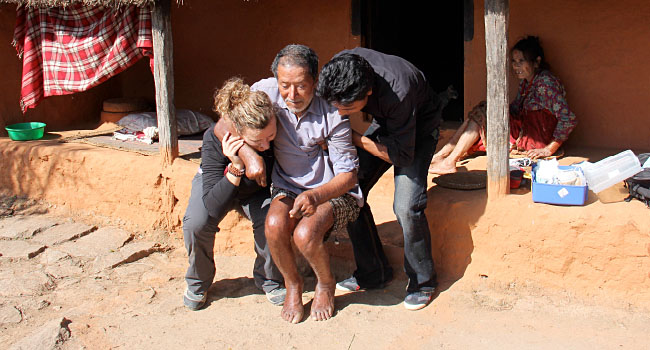
For the record, this is my second time writing this blog post. I wrote one a couple of weeks ago and Andrew had politely given me some feedback on it, called it fluffy, and asked me to consider rewriting it. Something about me not realizing how much I had grown here in Nepal, and sort of missing the boat on that in my first attempt. Needless to say, I was disheartened by his comments and stewed for a few days over them. I had already been through so many challenging experiences at that point and I wasn't really up for delving deeper anymore. But as I have learned (a few times over) there really is no where to run and nothing to distract you here in Kogate, Nepal. It's like acupuncture bootcamp, complete with mental, emotional and physical components.
So what do I write about then? I still had about a week and a half here, and to be honest I wasn't feeling particularly inspired by anything. Don't get me wrong, I have had many many amazing experiences while in Nepal that I will cherish forever. But sometime in this past year I stopped connecting with my heart. I felt exhausted, and therefore I would remain emotionally detached from pretty well everything to avoid the exhaustion. Unfortunately this detachment showed up in clinic, and I was having a hard time connecting with patients. I didn't recognize this disconnect until it was brought up via my initial blog post. So a few good cries and emotional talks later, I had arrived. Now this still is no big, ah ah, blow my mind, breakthrough moment. It did however spark a little something that I only expect will grow with time. But maybe those are the best kinds of insights.

I have written about Bim before in my personal blog, I've treated him a few more times since then and gotten to know him a little more. He is a man that we see on our way to the village of Ipa, where our outreach clinic is. Bim is actually the reason that ARP is here in Kogate. He initially started travelling seven hours to the Chapagoaon clinic for treatments when ARP was practicing there. His family told ARP that they should come to Kogate to practice, and 9 months later here we all are. Thanks to Bim, he is the reason so many people have received medical attention.
One of the last days that I was to go to Ipa, Andrew gave me one of his insightful speeches. He told me that this man is surely dying, he will not live much longer, and he really hasn't had the best quality of life these past four years. So today, your charting and point selection really doesn't matter. What matters is that you make connection with him. I'm thinking to myself...is this about me? Or is everyone getting this inspirational speech? No, I was right, it was specifically for me.
The treatment went as usual. How are you feeling today? Any noticeable changes? How's your sleep, breathing, bowel movements? Bim began telling me about how tighten and painful his legs were, and when I touched them I could feel the bow strings that were his tendons. I learned that he has been in a contracted sitting position pretty well ever since his disease became debilitating. Bim is always seated outside when we come so I started asking his wife how she gets him in and out of the house. He has a large family, but they are not always around to help them, so it is up to her to care for her husband of 42 years. She looks to weigh about ninety pounds, and is not in optimal health herself. She says that she has to drag him in and out of the house when she has no help, so he spends his days on the front porch. I was sitting there beside Bim listening to this, wishing that his family would be of more help to them, but who am I to judge this family. They are as supportive as they can be.
Then an idea struck me as I was listening to Suman, my interpreter, change my English words into Nepali. Suman looks pretty strong, and I've got some muscle on me to, what if we took Bim on a walk? Right now? Why expect the family to do this if were fully capable? So that's what we did. With one of Bim's arms over each of our shoulders we picked him up and walked him around their small courtyard. Because he was only able to use his tip toes we were pretty well carrying dead weight. It was substantially more challenging than I would have thought. It was only a short walk, but here's the best part; when we sat Bim back down in his spot, his face was beaming. I have truly never seen such gratitude on someone's face. In that moment I was more than humbled.

This story isn't about this cool thing that I did to make a sick man smile, and it sure isn't a pat on the back for myself either. Actually anytime that someone has told me how proud they are of me for what I am doing for the people of Nepal I want to say, thank you, but it's quite the opposite of what you think. It's more like this: I've been changed by the people and experiences here in Nepal. So be proud of Nepal and people like Bim for giving me the opportunity to come back to my home and be able to share with you all how to become more heart connected to oneself and others. - Allissa Keane











